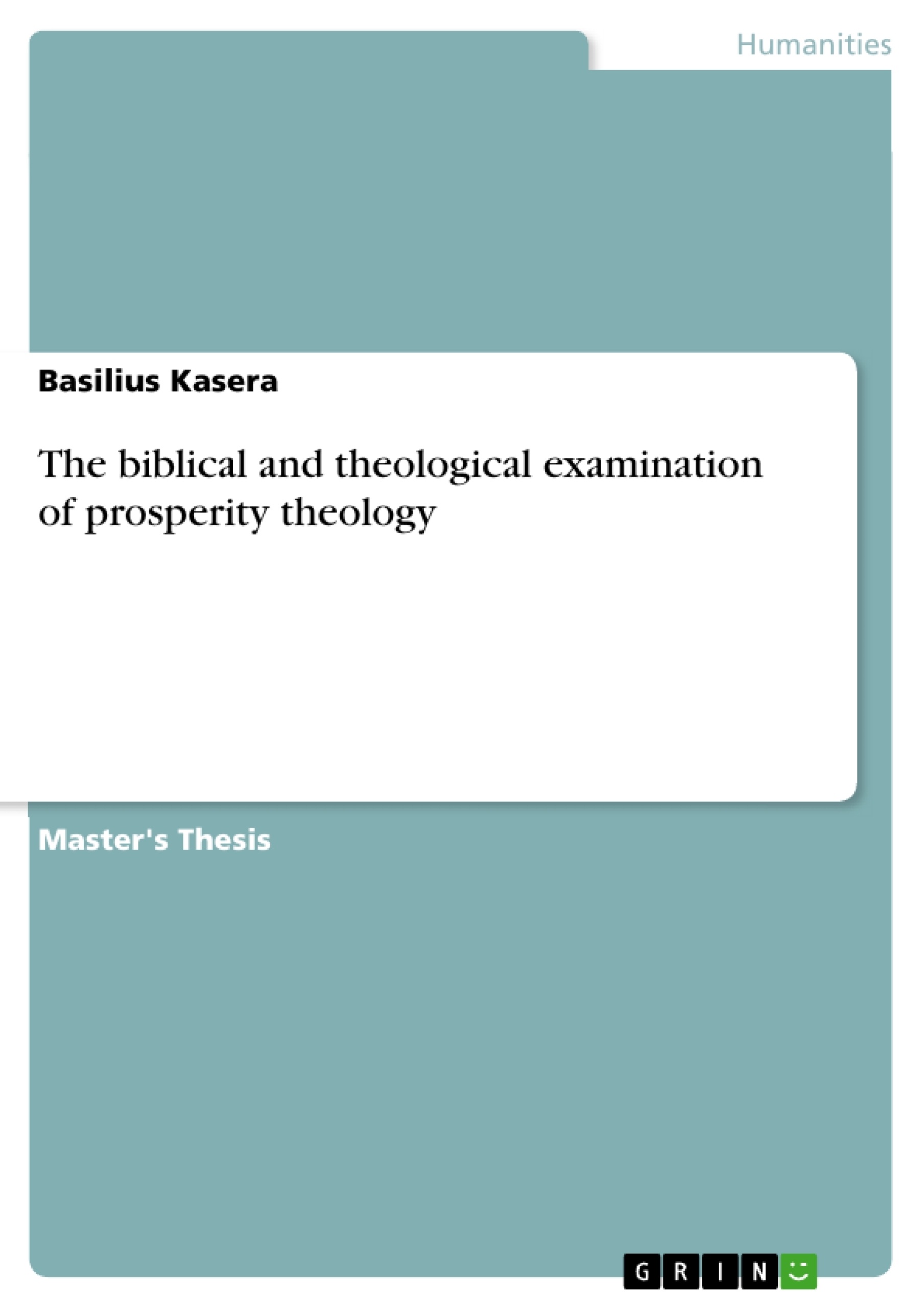This thesis conducts a biblical and theological analysis of the prosperity theology’s (PT) impact amongst the poor. The main problem is to seek ways of effectively responding to the biblical, theological, and ideological problems raised by PT in Namibia, without overlooking the social issues of poverty and suffering, which this theology claims to be solving. The subject under discussion is found in various denominations but especially amongst neo-Pentecostal churches and it is not a standardised theology. Through interacting with the various views of the proponents and opponents this research proposes that although PT may have certain positive aspects, it is a theology established upon faulty hermeneutics and is not helpful in providing biblically and theologically sound solutions to the problem of poverty.
The research aims to show that Christians have a biblical mandate to care for the poor and to work towards assisting the poor to help themselves. However, we do not foresee a time in the here and now when poverty will be totally abolished. Living with this painful reality, we have the duty of continuously pointing people to the future hope in Christ. On the other hand, our looking to the future hope does not exempt us from doing our best in helping people in the here and now as God enables us.
The research shows that the gospel is the hope for humanity and we should do away with methods and practices that do not have their roots in Scripture. Moreover, the church has a duty to warn against any theology that is conducted in an irresponsible manner and is given to reductionist arguments when it comes to providing solutions to human problems. Therefore, the research seeks to suggest biblical, theological and practical ways of responding to the issue of poverty and ministry to the poor.
Inhaltsverzeichnis (Table of Contents)
- Introduction
- Chapter 1: What is Prosperity Theology?
- The Biblical Perspective
- The Theological Perspective
- The Historical Perspective
- Chapter 2: Prosperity Theology's Impact on the Poor
- The Socio-Economic Context
- The Theological Implications
- The Practical Implications
- Chapter 3: A Biblical and Theological Critique of Prosperity Theology
- Hermeneutical Problems
- Theological Problems
- Ethical Problems
- Chapter 4: Towards a Responsible Theology of Poverty
- The Gospel and Poverty
- The Church's Role in Poverty Alleviation
- Practical Strategies for Ministry to the Poor
Zielsetzung und Themenschwerpunkte (Objectives and Key Themes)
This thesis aims to explore the biblical and theological foundations of prosperity theology, examining its impact on impoverished communities in Namibia. The study seeks to identify the strengths and weaknesses of this theological approach and propose alternative ways of understanding and addressing poverty from a biblical and theological perspective.
- Biblical and theological analysis of prosperity theology
- Impact of prosperity theology on the poor in Namibia
- Critique of prosperity theology's hermeneutics, theology, and ethics
- Developing a responsible theology of poverty grounded in Scripture
- Exploring the church's role in poverty alleviation and ministry to the poor
Zusammenfassung der Kapitel (Chapter Summaries)
Chapter 1 examines the concept of prosperity theology, exploring its biblical, theological, and historical roots. Chapter 2 investigates the impact of prosperity theology on impoverished communities in Namibia, considering the social, economic, and theological implications. Chapter 3 offers a critical analysis of prosperity theology, highlighting its hermeneutical, theological, and ethical problems. Chapter 4 proposes a responsible theology of poverty, drawing upon Scripture to guide the church's response to poverty and the ministry to the poor.
Schlüsselwörter (Keywords)
Prosperity theology, poverty, Namibia, biblical theology, theological critique, hermeneutics, ethics, gospel, church, ministry to the poor, poverty alleviation.
Frequently Asked Questions
What is the main problem with Prosperity Theology (PT)?
The research suggests PT is based on faulty hermeneutics and fails to provide biblically sound solutions to the actual social issues of poverty and suffering.
How does Prosperity Theology impact the poor in Namibia?
It raises ideological and theological problems by claiming to solve poverty while often using reductionist arguments that don't address socio-economic realities.
What is the church's mandate regarding poverty according to this study?
Christians have a biblical mandate to care for the poor and assist them in helping themselves, while pointing to the future hope in Christ.
Does the research believe poverty can be totally abolished?
No, it acknowledges that poverty will likely not be totally abolished in the "here and now," making the gospel's hope even more significant.
What are the key critiques of Prosperity Theology in this thesis?
The critique focuses on three main areas: hermeneutical (interpretation) problems, theological inconsistencies, and ethical concerns.
- Quote paper
- Master Basilius Kasera (Author), 2012, The biblical and theological examination of prosperity theology, Munich, GRIN Verlag, https://www.grin.com/document/233165



